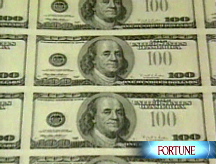Citigroup comes clean on TARP uses
Amid heavy scrutiny from taxpayers and lawmakers, the bank issues a report detailing its use of $45 billion in government bailout funds.
NEW YORK (CNNMoney.com) -- Citigroup offered its first glimpse Tuesday into how it is spending the $45 billion in government bailout money that the ailing bank has received in recent months.
Faced with intense scrutiny from taxpayers and Capitol Hill about its spending habits in recent weeks, the New York City-based bank issued its first quarterly progress report on its spending of funds from the government's Troubled Asset Relief Program, or TARP.
Citigroup (C, Fortune 500) said it had approved $36.5 billion in loans and other commitments backed by TARP during the fourth quarter of 2008, which included making $1 billion in student loans and $2.5 billion in business and personal loans. The bank also said it expanded credit lines and opened new accounts for credit cardholders.
The bulk of the TARP funds - $27.5 billion to be exact - was earmarked towards the housing market. Citigroup said it spent $10 billion on mortgage-backed securities guaranteed by Fannie Mae and Freddie Mac, a move aimed at loosening up frozen credit markets, according to the bank.
Only $8.2 billion was earmarked for making actual mortgage loans to families and individuals with good credit histories.
Citigroup did not indicate how it spent the remaining $8.5 billion of the $45 billion in government funds.
"Our responsibility is to put TARP capital to work quickly, prudently, and transparently to support U.S. consumers, businesses and our communities during these challenging times," Citigroup CEO Vikram Pandit said in a statement.
But Tuesday's revelations by the company, however, did little to elicit much sympathy from the government.
Isaac Baker, a spokesman for the Treasury Department, said the announcement was "a step forward," but added that more needed to be done to remedy the ongoing credit crunch.
Treasury officials are expected to provide details about how they plan to spend the second half of the government's $700 billion rescue package early next week, including new transparency and accountability measures.
Banks' willingness to lend money has become a focal point in the ongoing crisis after the U.S. government provided nearly $200 billion in government funds to financial firms in an effort to get credit flowing again.
A survey of top loan officers across the country published Monday by the Federal Reserve revealed that credit remains tight at the nation's banks, despite government aid.
Lawmakers and taxpayers have accused banks of using much of the TARP money to fund acquisitions, pay lavish bonuses or other seemingly frivolous expenses.
Fearing further backlash, Citigroup was forced to rethink its planned purchase of a $42 million corporate jet last month following Congressional scrutiny.
The bank is also said to be now considering nixing its corporate sponsorship deal with the New York Mets that involves the naming rights for the team's new stadium, according to a report in the Wall Street Journal Tuesday.
Citigroup told CNN in a statement though that it has a "legally binding agreement" with the Mets, and that it is "using no TARP capital for Citi Field, or for marketing purposes."
Hoping to deflect some of the criticism of their spending, Citigroup and other big banks are also trying to offer a bit more transparency about what they are doing with TARP funds.
Rival Bank of America (BAC, Fortune 500), which has received $45 billion in government aid, said last week it would file quarterly reports on its lending activity.
And West Coast banking giant Wells Fargo (WFC, Fortune 500) revealed Monday that it paid a $371.5 million quarterly dividend to the U.S. Treasury in exchange for the $25 billion that the Treasury Department invested in the bank last fall. ![]()


